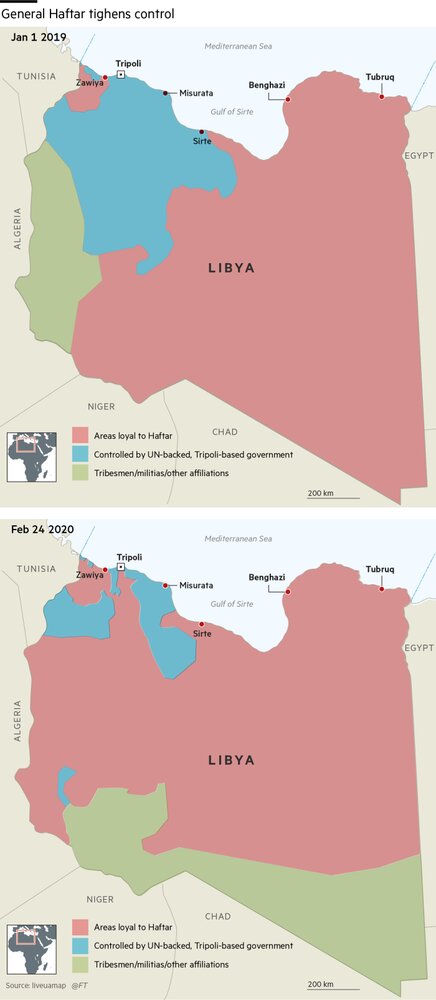UN urge warring Libyan factions to negotiate
Libya’s oil blockade loss surpasses $2b

The UN’s Libya mission and world powers on Tuesday urged the country’s warring parties to engage in peace efforts, as doubts hung over talks set to start the next day in Geneva.
Libya’s National Oil Company (NOC) said financial losses over the blockade of Libya’s vital oil fields and ports have rapidly swelled, surpassing $2b on Tuesday, with production dropping from a typical 1.2m bpd to about 120,000 this week.
On Sunday NOC said that guards under the command of renegade general Khalifa Haftar’s forces shut down the two key oil fields in the country’s southwestern desert, following earlier closure of all eastern export terminals. Libya is home of Africa’s largest proven crude oil reserves.
Oil-rich Libya, a country of 6.5 million, has been splintered between competing factions and militias since former leader Muammar Gaddafi was overthrown and killed during a NATO-supported uprising in 2011.
The 76-year-old Haftar is the leader of the Libyan National Army (LNA) which controls most of south and eastern Libya, including country’s ports and has been laying seed to the capital, Tripoli. Haftar is backed by the UAE, Egypt, Russia and Jordan, with political backing from France. The Tripoli government controls just a shrinking corner of the country’s west, but maintains highly-valued authority over Libya’s central bank, which holds oil revenues.
Since Haftar launched an offensive against Tripoli, seat of the UN-recognized Government of National Accord (GNA) last April. GNA was created during UN-brokered talks in 2015. The unelected administration has little influence outside Tripoli. According to Financial Times at least 2,000 Libyans have been killed and more than 150,000 forced to flee their homes in areas such as Ain Zarah since Gen Haftar launched a surprise assault on Tripoli last April.
U.S. stance has been ambiguous. In past U.S. has supported UN-backed government and efforts to reach a political solution, as have the UK and France. But Trump appeared to break with that policy last May when he made a phone call to Haftar, during which he voiced support for a shared vision with the commander.
Meanwhile, according to news reports from Canada last summer, Ari Ben-Menashe is an Iranian-born former Israeli intelligence officer whose Montreal-based firm Dickens and Madson Inc. Ben-Menashe has previously been paid to lobby for ousted Zimbabwean dictator Robert Mugabe and Libyan militia commander Khalife Hafter.
The firm also proposes alliance between the Sudanese regime and Libyan militia commander, Haftar, in which the Libyan commander would prove “military help” to Sudanese regime in exchange for funding for Sudan.
Turkey renews support
The dynamics of the war shifted in January after Turkey deployed troops to Libya, heeding a plea from the besieged Tripoli government as Russian mercenaries and air superiority offered by Chinese-made drones –supplied and allegedly operated by the UAE – appeared to tip the balance in Haftar’s favor.
Turkey insists that its troops have no combat role. But Ankara has dispatched Syrian Turkmen militias to Libya, adding yet another foreign ingredient to the mix. Having started to arrive in December, there are estimated to be some 3,000 Syrian foreign fighters in Libya, a foreign diplomat was quoted by Financial Times.
Meanwhile, Turkish President Recep Tayyip Erdogan said Tuesday that two of his country’s troops had been killed in Libya, where Ankara has sent dozens of military trainers since signing a deal with the GNA Premier Fayez al-Sarraj last year.
On November 27, 2019, Turkey and Libya’s GNA signed a bilateral Memorandum after a meeting between Erdogan and al-Sarraj in Istanbul. The deal enables Turkey to secure its rights in the Mediterranean while preventing any fait accompli maneuvers by other regional states.
Greece has not welcomed the deal, regarding it as a violation of its own rights.
Last week, Erdogan confirmed pro-Turkish Syrian fighters were in Libya alongside the training teams.
Russia is widely reported to have sent mercenaries to back Haftar’s forces, which are also supported by the United Arab Emirates. For the UAE, it is one of the most geographically distant examples of the assertive foreign policy Abu Dhabi adopted in the wake of the 2011 Arab uprisings.
Erdogan speaking at ruling AK Party group meeting last week in Ankara said that Turkey will support Libya’s GNA in Tripoli in taking control of the whole country.
LNA said Tripoli port attack targeted Turkish weapons, reported Al Jazeera last week. Turkey denies ships carrying arms were in Tripoli port after rocket barrage led Tripoli-based GNA to pull out of UN-brokered talks.
EU foreign ministers agreed on Feb. 17 to launch a naval mission to enforce an arms embargo, which the UN said was being violated by air, land and sea. The naval operation will be authorized to intervene to stop weapons shipments into North African state.
UN Libya envoy Ghassan Salame launched a second round of talks on Feb. 18, said there was “more hope” this time, mainly because of the approval of the UN Security Council resolution calling for a “lasting ceasefire”.
Talks are being held in Geneva and Salame was trying to convince Tripoli delegation to stay and resume indirect talks, sources said.
The International Crisis Group has said tensions between Iran and the U.S., and violence in Libya and Yemen are among the most important conflicts to watch in 2020. Libya was chosen because Russia and Turkey were getting involved. Brussels-based ICG is an independent, non-profit, non-governmental organization which seeks to sound the alarm to prevent deadly conflict
Leave a Comment